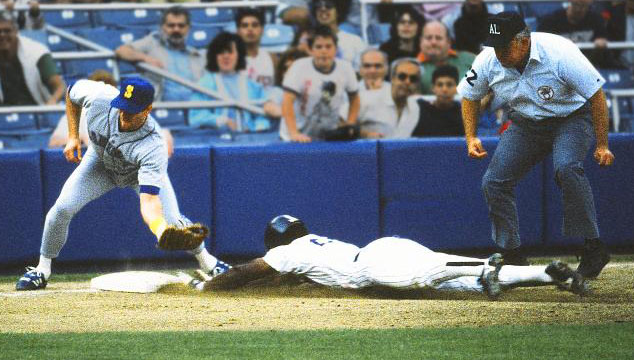As I’ve mentioned in a previous post, I have a passion for two topics that aren’t often linked: personal growth and baseball. This week, in honor of the start of baseball season, I’d like to share a life lesson from my favorite sport. (But don’t worry: you don’t have to be a baseball fan to enjoy or benefit from this post!)
The theme for this post actually came to me over 15 years ago, when I got the idea to write a book called In the Big Inning: Life Lessons from the Great American Pastime. I envisioned it as a coffee-table book filled with full-color pictures and numerous examples from actual games–showing how they provide insights that extend far beyond the baseball diamond. I felt that the book would practically write itself. After all, this is a game where people use their individual talents to work together toward the common goal of helping one another arrive safely at home!
However, as I began to grasp the full scope of the undertaking (research, design, and numerous copyright-related headaches), I put the project on the shelf. Perhaps I’ll get back to it someday, but for now I’ll take the “Halfway up the Mountain” approach–realizing that it doesn’t have to be all or nothing–and provide a single example.
The Game: A Time to Steal
I can trace the origin of my book idea back to a single moment: October 6, 1997, top of the 8th inning of the tie-breaking fifth game of the A.L. Division Series between the Cleveland Indians and the New York Yankees.
After a two-out single gave the Yankees an opportunity to tie the 4-3 game, they brought in the speedy Andy Fox to pinch-run. This was a perfect situation for Fox to steal second base, which would put him in position to score on a single–a likely scenario, since the next batter was Wade Boggs, one of the greatest singles hitters of all-time.
(Mini lesson for non-fans: A reasonably fast runner can almost always score from second base on a two-out hit, but scoring from first requires at least a double. Roughly 3/4 of Boggs’ hits are singles. The fact that Cleveland’s pitcher was an excellent right-hander, Jose Mesa, made attempting a steal an even better idea.)
It seemed that the Yankees’ manager (the usually shrewd Joe Torre) would certainly have Fox attempt to steal second–which he had better than 2/3 odds of doing successfully. Of course, Boggs would still have to get a hit (about a 30% chance, given his excellent batting average), leaving about a 20% chance of scoring–not phenomenal, but roughly three times better than the odds of getting the two consecutive hits (or one extra-base hit) necessary to score without stealing.
It seemed like a no-brainer.
But Fox never attempted to steal. Sure enough, Boggs hit a single. Instead of scoring the tying run (as he would have done if he’d stolen second) Fox made it only to third base. The next batter grounded out, ending the inning without a run. When the Yankees failed to score in the 9th inning as well, they were eliminated from the playoffs–the only time in a five-year stretch that they didn’t win the World Series!
The Lesson: The Risk of Playing it Safe
Even through my disappointment at watching my beloved Yankees lose, I could see an important life lesson: Sometimes, playing it safe is the biggest risk of all!
Yes, trying to steal second would have been a risk–but not as big a risk as doing nothing! Yes, if Fox had been thrown out, many people would have criticized and second-guessed the attempt. Yes, he may have failed–but he would have failed while “daring greatly.”
(Or, as I believe, he would have succeeded!)
This whole episode certainly reinforced the lesson that errors of omission (NOT doing something) are just as costly as errors of commission. In fact, most people feel greater regret for the things that they never tried than for things they tried but failed.
When you try, at least there’s always a chance at success. On the other hand, to use a relevant quote from another sport:
“You miss 100% of the shots you don’t take.” -Wayne Gretzky
When you don’t take a chance, you don’t eliminate the chance of failure, but you do eliminate your chance of success!
Nothing Ventured, Nothing Gained
Have you ever had to choose between taking a risk and playing it safe? Did you choose to stick with the known, or did you venture into new territory? Have you ever risked criticism or failure in order to pursue a dream?
Whenever you make a bold, proactive move, there’s always the possibility that you’ll stumble. But either way, win or lose, at least you’ll never have to live your life wondering “What if…”! What if I’d taken that chance? What if I’d pursued that dream? What if Fox had tried to steal?
The good news is that regardless of what choices you’ve made in the past–taking risks or playing it safe–there’s ALWAYS time to live boldly! There’s always another chance. There’s always next year.
Just ask the Yankees: after their playoff loss in 1997, they came back stronger than ever…and won the World Series the next three years in a row!
…
Photo: Stealing third base, 1985, by Rick Dikeman (not from the series discussed above, but a much more dramatic scene–featuring all-time stolen base leader Rickey Henderson, who was caught stealing 335 times…but was successful over 1400 times!).


